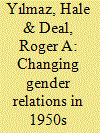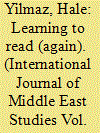| Srl | Item |
| 1 |
ID:
180038


|
|
|
|
|
| Summary/Abstract |
This article examines patterns of gender relations in Ankara in the early 1950s. Based in part on the unpublished memoirs of Kemal Tanyolaç, who provided extensive details of his bachelor years in Ankara, this article explores a wide variety of relationships between men and women, from traditional marriage-oriented matchmaking and modern dating, through business relationships as work colleagues or landlord and tenant, to different types of illicit sexual relations. We look at changes in how men and women viewed each other and their relationships, and what effects that had on the ongoing social changes of the time. We argue that all types of relationships and the possibilities they entailed, including prostitution, need to be understood in complex, nuanced ways in order to understand the society that was emerging in post-Second World War urban Turkey.
|
|
|
|
|
|
|
|
|
|
|
|
|
|
|
|
| 2 |
ID:
108830


|
|
|
|
|
| Publication |
2011.
|
| Summary/Abstract |
This article reconsiders Turkey's 1928 alphabet reform by shifting the focus from the state to the social experiences of alphabet change. Rather than assuming an obedient and indifferent public silently following the decrees of an authoritarian and repressive regime, it explores the actual processes, institutions, and lived experiences of the alphabet reform by drawing on a variety of sources, including unpublished archival evidence and personal narratives collected through oral interviews. It draws attention to the multiplicity of experiences of learning to read and write (the new letters) as well as to the persistence of the Ottoman script; it also examines the variety of ways that state authorities dealt with this persistence. The analysis of this particular reformist measure has implications for understanding social change and the emergence of a nationalist culture in the early republican period as well as state-society relations and the nature of the Kemalist state.
|
|
|
|
|
|
|
|
|
|
|
|
|
|
|
|